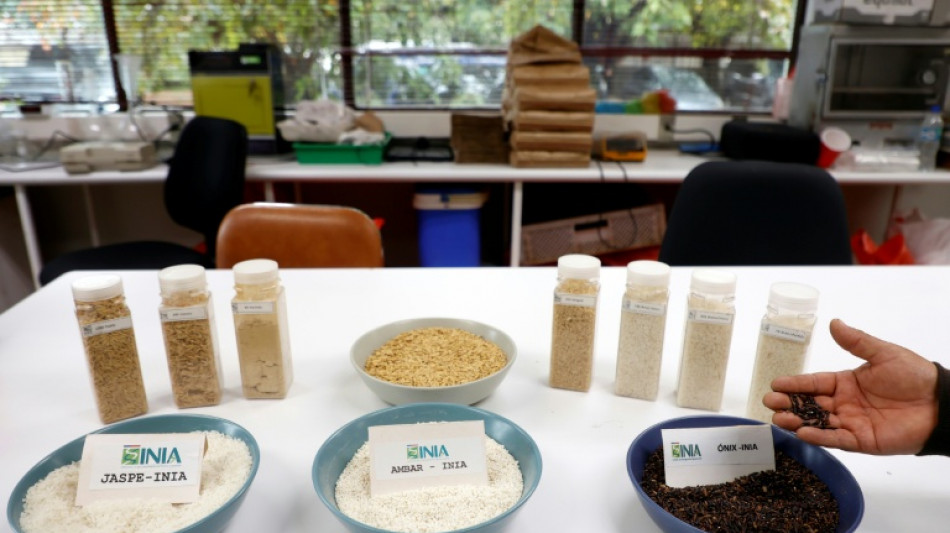
-
 Japa's Miura and Kihara capture Skate America pairs gold
Japa's Miura and Kihara capture Skate America pairs gold
-
Who can qualify for 2026 World Cup in final round of European qualifiers

-
 UK to cut protections for refugees under asylum 'overhaul'
UK to cut protections for refugees under asylum 'overhaul'
-
England's Tuchel plays down records before final World Cup qualifier

-
 Depoortere double helps France hold off spirited Fiji
Depoortere double helps France hold off spirited Fiji
-
Scotland face World Cup shootout against Denmark after Greece defeat

-
 Hansen hat-trick inspires Irish to record win over Australia
Hansen hat-trick inspires Irish to record win over Australia
-
Alcaraz secures ATP Finals showdown with 'favourite' Sinner

-
 UK to cut protections for refugees under asylum 'overhaul': govt
UK to cut protections for refugees under asylum 'overhaul': govt
-
Spain, Switzerland on World Cup brink as Belgium also made to wait

-
 Sweden's Grant leads by one at LPGA Annika tournament
Sweden's Grant leads by one at LPGA Annika tournament
-
Scotland cling to hopes of automatic World Cup qualification despite Greece defeat

-
 Alcaraz secures ATP Finals showdown with great rival Sinner
Alcaraz secures ATP Finals showdown with great rival Sinner
-
England captain Itoje savours 'special' New Zealand win

-
 Wales's Evans denies Japan historic win with last-gasp penalty
Wales's Evans denies Japan historic win with last-gasp penalty
-
Zelensky renews calls for more air defence after deadly strike on Kyiv

-
 NBA's struggling Pelicans sack coach Willie Green
NBA's struggling Pelicans sack coach Willie Green
-
Petain tribute comments raise 'revisionist' storm in France

-
 Spain on World Cup brink as Belgium also made to wait
Spain on World Cup brink as Belgium also made to wait
-
Spain virtually seal World Cup qualification in Georgia romp

-
 M23, DR Congo sign new peace roadmap in Doha
M23, DR Congo sign new peace roadmap in Doha
-
Estevao, Casemiro on target for Brazil in Senegal win

-
 Ford steers England to rare win over New Zealand
Ford steers England to rare win over New Zealand
-
Massive march in Brazil marks first big UN climate protest in years

-
 Spain rescues hundreds of exotic animals from unlicensed shelter
Spain rescues hundreds of exotic animals from unlicensed shelter
-
Huge fire sparked by explosions near Argentine capital 'contained'

-
 South Africa defy early red card to beat battling Italy
South Africa defy early red card to beat battling Italy
-
Sinner beats De Minaur to reach ATP Finals title match

-
 Zelensky vows overhaul of Ukraine's scandal-hit energy firms
Zelensky vows overhaul of Ukraine's scandal-hit energy firms
-
South Africa defy early red card to beat Italy

-
 Alex Marquez claims Valencia MotoGP sprint victory
Alex Marquez claims Valencia MotoGP sprint victory
-
McIlroy shares lead with Race to Dubai title in sight

-
 Climate protesters rally in Brazil at COP30 halfway mark
Climate protesters rally in Brazil at COP30 halfway mark
-
Spike Lee gifts pope Knicks jersey as pontiff meets film stars

-
 BBC caught in crossfire of polarised political and media landscape
BBC caught in crossfire of polarised political and media landscape
-
'Happy' Shiffrin dominates in Levi slalom for 102nd World Cup win

-
 Palestinian national team on 'mission' for peace in Spain visit
Palestinian national team on 'mission' for peace in Spain visit
-
Brazilian 'Superman' cheers child cancer patients in Ghana

-
 India close in on win over South Africa after Jadeja heroics
India close in on win over South Africa after Jadeja heroics
-
Huge explosions rock industrial area near Argentina's capital

-
 Bezzecchi takes pole for Valencia sprint and MotoGP
Bezzecchi takes pole for Valencia sprint and MotoGP
-
Dominant Shiffrin leads after first slalom run in Levi

-
 Nine killed in accidental explosion at Indian Kashmir police station
Nine killed in accidental explosion at Indian Kashmir police station
-
Climate protesters to rally at COP30's halfway mark

-
 Fighting South Africa lose Rickelton after India 189 all out
Fighting South Africa lose Rickelton after India 189 all out
-
Harmer leads South Africa fightback as India 189 all out

-
 Prison looms for Brazil's Bolsonaro after court rejects his appeal
Prison looms for Brazil's Bolsonaro after court rejects his appeal
-
EU bows to pressure on loosening AI, privacy rules

-
 India close in on lead despite South African strikes
India close in on lead despite South African strikes
-
Curry's 49 points propel Warriors in 109-108 win over Spurs


Less-thirsty rice offers hope in drought-stricken Chile
A cold, dry part of Chile might not sound like the best place to grow rice, a famously thirsty grain that thrives in tropical conditions.
But a new strain of the world's favorite cereal developed by scientists in the drought-plagued South American country has generated hope that rice can be grown in seemingly inhospitable conditions.
Using an innovative planting technique, Javier Munoz has been trialling the "Jaspe" strain created by experts at the Agricultural Research Institute's (INIA) Rice Breeding Program.
It is one of several research efforts worldwide to come up with less resource-hungry crops at a time of increased water scarcity in parts of the world due to global warming.
Using Jaspe in combination with a growing method that requires only intermittent watering cut the Munoz family's water consumption in half in a country that has for generations cultivated rice in flooded fields, or paddies.
At the same time, yield rocketed, with each seed yielding about thirty plants -- nearly ten times more than a conventional rice field.
Irrigating rather than flooding rice fields "is a historic step... towards the future," Munoz, 25, told AFP at his farm in the region of Nuble, a nearly five-hour drive south from the capital Santiago.
Next year, he said, he hoped to increase his production area from one hectare to five.
Chile's Maule and Nuble regions contain the southernmost rice fields in the world.
Typically grown in wetter, tropical areas, rice cultivation in Chile has been hampered by an unprecedented megadrought, now in its 15th year and driven by climate change, according to scientists.
Each Chilean eats on average 10 kilograms (22 pounds) of rice per year -- nearly half of which is grown domestically and 80 percent of that in flooded fields, according to the SRI-Rice research center at Cornell University.
The flooding method, which requires about 2,500 liters (660 gallons) of water per kilogram (2.2 pounds) of rice, is used around the world to combat weeds and regulate the temperature around vulnerable seedlings.
- Less methane -
The Jaspe rice strain was obtained by INIA agricultural engineer Karla Cordero and colleagues by crossing a Chilean seed with a Russian one better adapted to cold and dry climates.
The modified seed is then grown using the SRI growing technique developed in Madagascar in the 1980s that involves spacing the seedlings further apart in enriched soil, and watering only sporadically to build a more resilient root system.
Cordero presented the results of nearly 20 years of experimentation -- conducted with backing from the Inter-American Institute for Cooperation on Agriculture (IICA) -- at an International Rice Research Conference in Manila in 2023.
The findings have yet to be published in a peer-reviewed scientific journal, but Chile's Agriculture and Livestock Service, an arm of the agriculture ministry, gave the green light in 2023 for the new strain of long-grain white rice to be rolled out commercially.
Apart from using less water and fewer seeds, the new Jaspe-SRI method also emits less methane, a potent planet-warming gas more famously produced by cows.
Rice cultivation in flooded paddies crawling with microorganisms is responsible for about 10 percent of human-caused methane emissions, according to the UN's Food and Agriculture Organization.
- 'Climate-smart' -
Jaspe has proven to be more resistant to storms, floods and heatwaves. "The plants are much more robust, which allows rice to be produced without flooding," Cordero said.
Makiko Taguchi, a rice cultivation expert at the UN Food and Agriculture Organization (FAO), told AFP the Chilean work amounted to "a promising approach to improving rice production while reducing the environmental impact."
Pointing to similar work being done in Japan, she said: "Obtaining resistant varieties is one of the main ways to increase resilience to climate change."
Cordero said the results suggested the approach could also work in other parts of the world "where large quantities of rice are produced and where there are droughts."
The team hopes to test Jaspe soon in Brazil -- the largest rice producer in the region -- and in other South American countries.
"This is the future," said Munoz. "If we want... food security and care about the environment, this is the way."
W.AbuLaban--SF-PST




